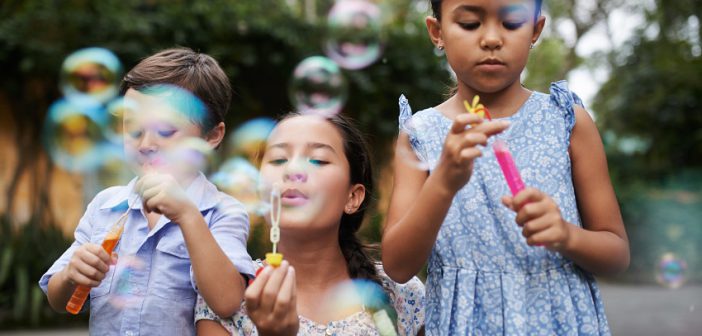As we approach the spring season, parents may face new challenges and opportunities in their parenting journey. To help navigate these changes, we turn to Dr. Erika Bocknek, a child development expert and family therapist, who offers advice on how to support our children’s mental health and well-being. Dr. Bocknek emphasizes the importance of recognizing signs that it’s time to regroup, such as when a child is asking for more attention or support. She also highlights the need to adapt our parenting style to meet our children’s evolving needs.
Parenting can be a challenging journey, particularly when it comes to promoting our children’s mental health and well-being. Children may experience different phases and challenges as they grow and develop, requiring that parents adjust their approach accordingly. In this article, we’ll explore some tips for navigating parenthood and supporting our children’s mental health, drawing on the expertise of Dr. Bocknek. From promoting positive body image to dealing with bullies, these tips can help parents create a supportive and nurturing environment for their children.
Look for signs that it’s time to regroup
Children often go through phases where they need more or less support or attention. As parents, it’s important to be aware of these changes and look for signs that it’s time to regroup. For example, if your child is asking you to “please listen” or saying “you never understand,” it could be a sign that they’re struggling with something and need more support. They may even seem angry with you, and you may experience the disconnect as frequent conflict. Dr. Bocknek, a child development expert, suggests prioritizing your relationship with your child over automatically cleaning up a mess, as you might have when they were younger. This may require a revision to your usual response, but it can help build a stronger and more trusting relationship with your child. Try pausing and adopting a curious stance with their child. Ask more questions and refrain from conversation-ending lectures. Wonder with your child about all the possible ways to think or feel about a challenge they face. Demonstrate your trust in your child by validating they have many assets and affirming that you are always there to talk openly.
Promote a positive body image
With swimsuit season around the corner, children may feel self-conscious about their bodies. Parents can take a proactive approach to promoting a positive body image that can help children feel empowered and self-assured during the summer months and, then, all year-round. This can include opening honest conversations about the very real pressures that we all face to conform to a single and rigid set of beauty standards, and sharing the ways that you cope with this issue. It can also include creating a culture at home in which the unique physical attributes of any given family member are noticed and celebrated rather than fearfully ignored. A good goal is to create space for conversation, seeking to understand how your child sees the world and their place in it without assuming your own viewpoint is the only possible perspective.
Help children deal with bullies or mean kids
Unfortunately, bullying is a common problem among children, and it can have a serious impact on a child’s mental health and well-being. With the weather changing and celebrations and gatherings increasing for kids, it’s important for parents to be prepared to help their children deal with bullies or mean kids. This can include teaching assertiveness skills, encouraging them to seek help from a trusted adult, and providing emotional support. The most important thing a parent can do is to stand firm on right and wrong behavior. Often in service of politeness, parents can be afraid to name another child’s behavior as aggressive or toxic, instead trying to reframe all behaviors as the result of potential complex internal emotional states. For example, your instinct may be to stay neutral and encourage your child to view the child who is acting in a mean way as acting either unintentionally or in a way that is simply misguided. While there is always the possibility that this is true, children must understand that impact matters as much as does intention. You can not be a real partner to your child when they are being harmed if you do not first align with their experience and affirm that, no matter what a person may be feeling, it is never okay to hurt someone else.
Be a close resource and trusted partner
Parenting is preparing someone for a future world that you’re not an expert in, says Dr. Bocknek. It’s important to remember that as parents, our job isn’t to have all the answers but to be a close resource and trusted partner for our children. This means being available to listen, provide guidance and support, and work together to find solutions to challenges that arise. It also means staying flexible, and paying attention to cues they give us that we need to regroup and adopt new approaches in order to stay close to them as they grow and the challenges they face without us becoming increasingly complex.
In conclusion, navigating parenthood can be a challenging but rewarding experience. By being aware of our children’s changing needs and staying in the conversation in response to complex problems like the risks they face in relation to their own body image or helping them deal with bullies, we can support our children’s mental health and well-being by remaining a trusted conversation partner over the long-term.





Hello! I came across your article about supporting children’s mental health and found it to be incredibly insightful. Parenting can be challenging, especially when it comes to ensuring our children’s mental health and well-being. I appreciate the tips you provided for navigating parenthood and supporting our children’s mental health.
In addition to the tips you provided, I wanted to mention another resource that may be helpful for parents and their children – Calmerry talk therapy online platform. Calmerry provides access to therapy professionals who specialize in working with children and adolescents. They offer individual and family therapy, as well as specialized therapy for issues like anxiety, depression, and behavioral problems.
It’s important for parents to seek help if they notice any concerning signs or symptoms in their children. Early intervention can make a significant difference in a child’s mental health and overall well-being. Therapy professionals on Calmerry can work with parents and children to develop personalized treatment plans and provide the support they need.
Thank you again for your valuable insights on navigating parenthood and supporting children’s mental health. If you or someone you know is in need of mental health support, I encourage you to consider seeking help from therapy professionals on Calmerry’s online therapy platform.